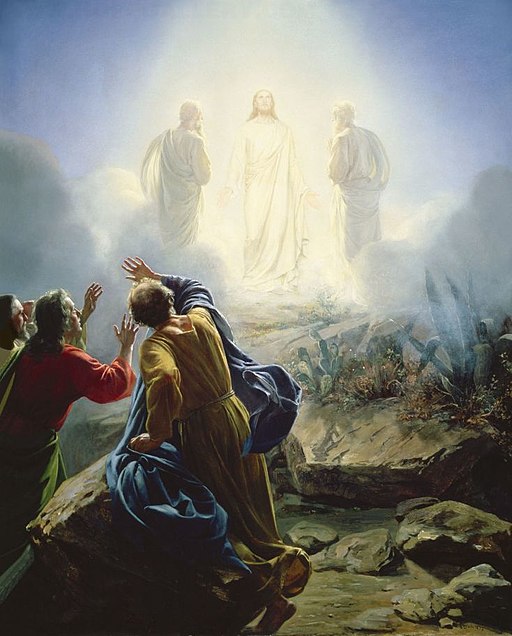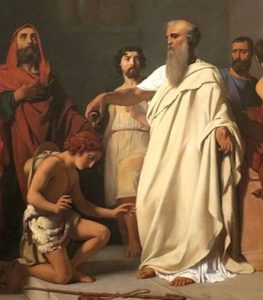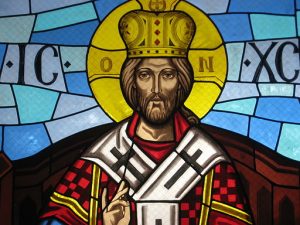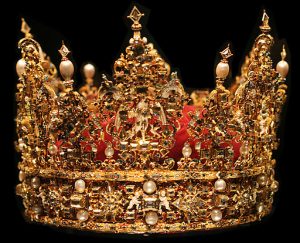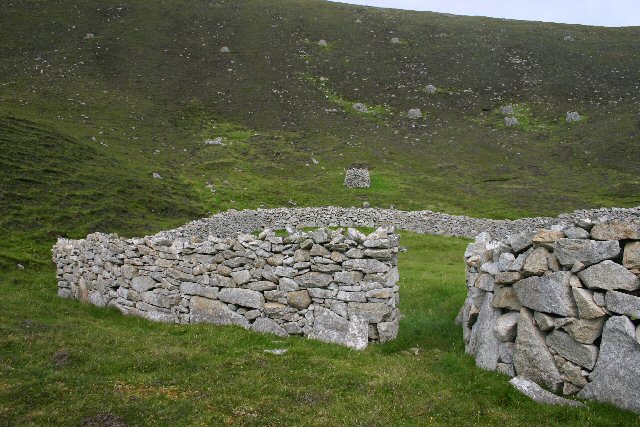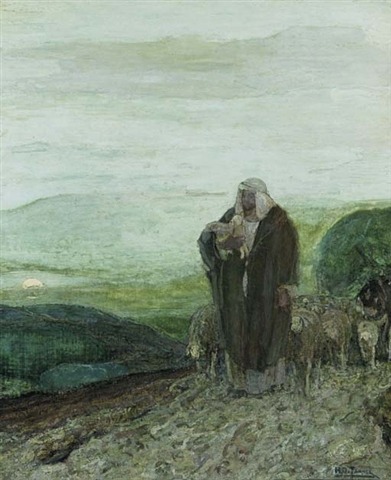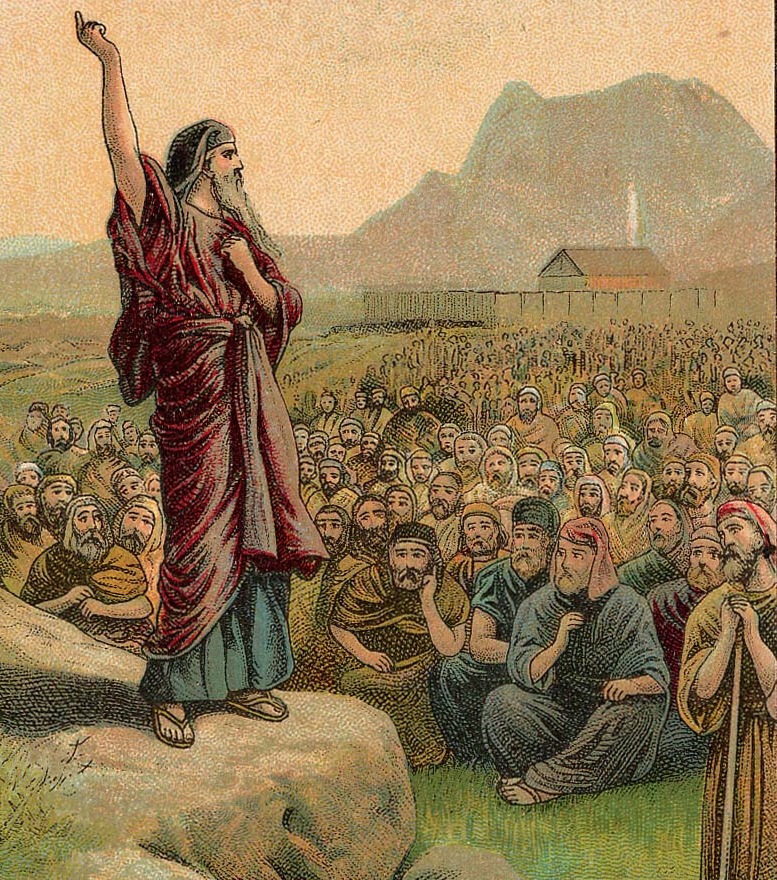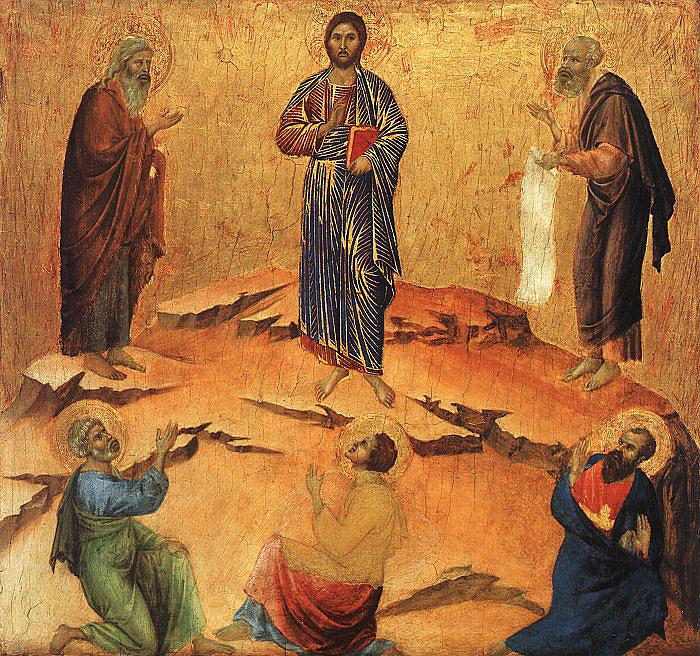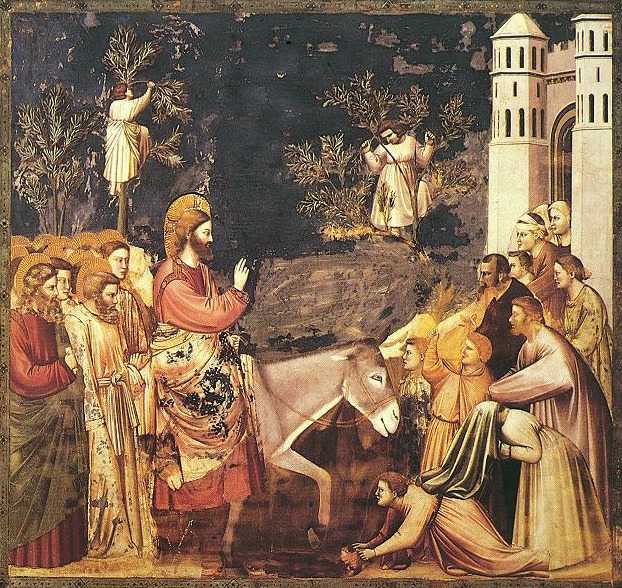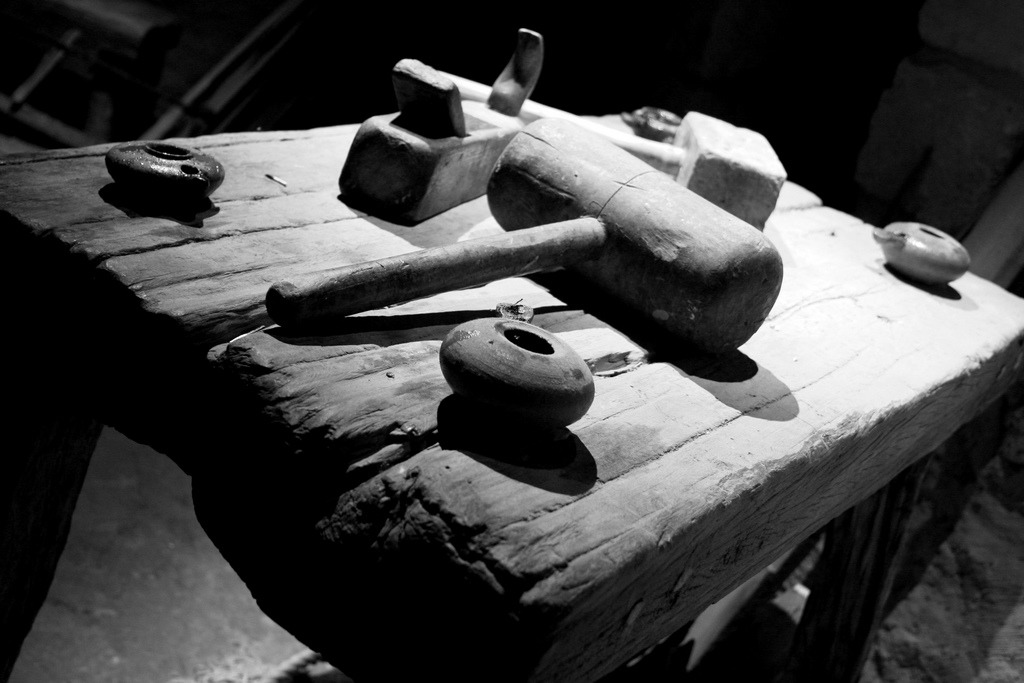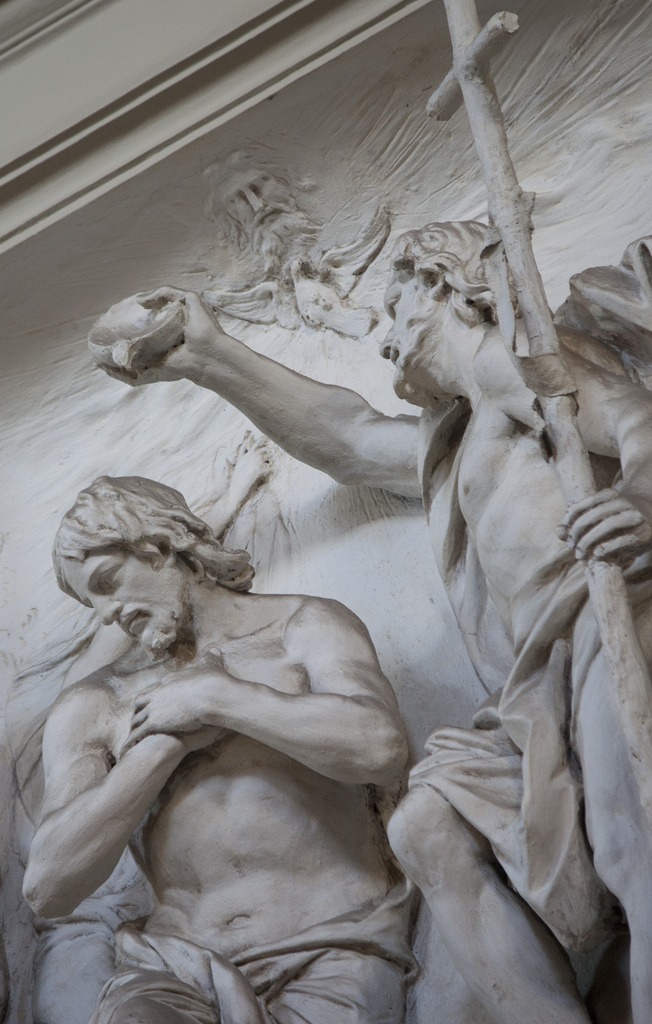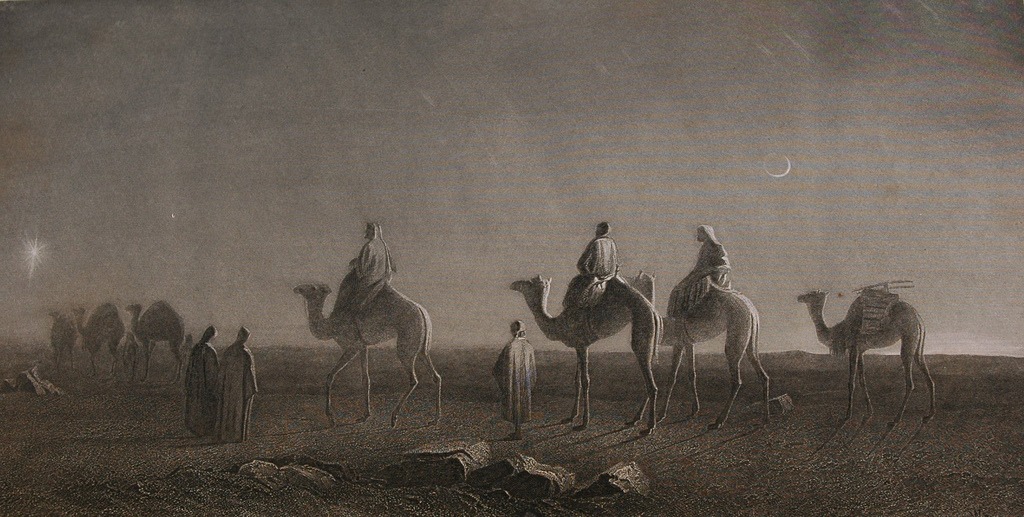Toward the end of Jesus’ ministry we find an odd scene. Jesus and a few of the disciples go up on a mountain, and Jesus’ face and clothes become brilliant. Both Moses and Elijah appear and speak to him, and God’s voice is heard speaking from a cloud. Mark describes it this way:
Six days later, Jesus took with Him Peter and James and John, and brought them up on a high mountain by themselves. And He was transfigured before them; and His garments became radiant and exceedingly white, as no launderer on earth can whiten them. Elijah appeared to them along with Moses; and they were talking with Jesus. Peter said to Jesus, “Rabbi, it is good for us to be here; let us make three tabernacles, one for You, and one for Moses, and one for Elijah.” For he did not know what to answer; for they became terrified. Then a cloud formed, overshadowing them, and a voice came out of the cloud, “This is My beloved Son (in whom I am well-pleased – Matthew), listen to Him!” All at once they looked around and saw no one with them anymore, except Jesus alone. (Mark 9:2-8)
This scene is called the “Transfiguration,” which refers to Jesus’ change of appearance to a glorified state. The account here overflows with ideas and imagery from the Old Testament. Knowing the characters involved and the echoes of earlier biblical scenes will shed much light on this passage.
Why were Moses and Elijah there?
Among the Jews, Moses has always been regarded as the greatest leader in their history. He redeemed them from slavery in Egypt, did miracles for them, mediated their covenant with God, and gave them God’s word. Yet they noted that Moses had said that one was coming after him that even greater than him:
The Lord your God will raise up for you a prophet like me from among your own brothers. You must listen to him! …The Lord said …”I will put my words in his mouth, and he will tell them everything I command him. If anyone does not listen to my words that the prophet speaks in my name, I myself will call him to account. (Deut 18:15-18)
It was understood by Jews in Jesus’ day that the coming Messiah would be “the prophet greater than Moses.” Moses’ presence on the mountain is a hint that Jesus is this prophet like Moses. Interestingly, Jesus also redeemed his people, did miracles, established a new covenant, and gave them God’s word! So indeed, he is like Moses, only greater.
Elijah was the greatest of all of the prophets of Israel, preaching to the northern kingdom to repent and to follow God and not the Baal idols. He is a part of another well-known messianic prophecy from Malachi that says:
Behold, I am going to send you Elijah the prophet before the coming of the great and terrible day of the LORD. He will restore the hearts of the fathers to their children and the hearts of the children to their fathers… (Malachi 4:5-6)
It was commonly assumed among the Jews that when the Messiah came, Elijah would come first to tell people to repent and to announce the Messiah’s arrival. In the next verses in Mark the disciples even ask about that, and Jesus says that John the Baptist had come in the spirit of Elijah to fulfill that mission. Still, the presence of Elijah on the mountain hints to the fact that Jesus is the one that Elijah was to proclaim.
The Law and the Prophets
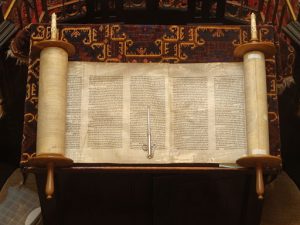 The presence of Moses and Elijah also has another meaning. In the early synagogue, two portions of the Hebrew Scriptures were read each week, one from the Torah (Law) and one from the Prophets. Moses was the representative of the Torah (law), often called the “books of Moses.” Elijah represented the “Prophets,” the books of the scriptures that included many prophetic writings.
The presence of Moses and Elijah also has another meaning. In the early synagogue, two portions of the Hebrew Scriptures were read each week, one from the Torah (Law) and one from the Prophets. Moses was the representative of the Torah (law), often called the “books of Moses.” Elijah represented the “Prophets,” the books of the scriptures that included many prophetic writings.
Together, the two figures hint at the idea that the “Law and the Prophets” are pointing toward Jesus as the coming redeemer. Moses and Elijah were speaking with Jesus about his coming death (see Luke 9) suggesting that Jesus’ sacrificial atonement is the culminating event of all of the Scriptures.
God’s Words from the Cloud
The words God speaks from the cloud are likewise significant. Each phrase comes from a messianic passage in Scripture.
- “This is my son” comes from Psalm 2, which is about the “Anointed one” (messiah in Hebrew), the one who will rule over the nations.
- “In whom I am well-pleased” (found in Matthew’s version of the Transfiguration scene) is from Isaiah 42, in another messianic passage about God’s chosen servant.
- “Listen to him,” is a quote from Deuteronomy 18 about the prophet greater than Moses.
Even though these passages are short, they were distinctive and recognized as messianic allusions. God was actually using the same “hinting” technique that rabbinic teachers used! Intriguingly, God chose one passage from the Law (Deuteronomy 18), one from the Prophets (Isaiah 42) and one from the Writings (Psalm 2) to show that Jesus was the one anticipated throughout all of Scripture.
Encounters on a Mountaintop
 In yet another intriguing parallel, Moses and Elijah both have experiences where they encounter God on a mountain top. In Exodus 33, God tells Moses to stand in a cleft of rock on Mt. Sinai, and God shows him his glory. Moses remains there 40 days afterward.
In yet another intriguing parallel, Moses and Elijah both have experiences where they encounter God on a mountain top. In Exodus 33, God tells Moses to stand in a cleft of rock on Mt. Sinai, and God shows him his glory. Moses remains there 40 days afterward.
In 1 Kings 19, Elijah also ascends a mountain — Mt. Horeb, which is another name for Mt. Sinai. At first he feels a strong wind and then an earthquake, and then finally encounters God as a still, small voice. He also stays there 40 days.
At the transfiguration, Moses and Elijah were experiencing God’s presence and glory once again, as they saw the fulfillment of God’s plan in Christ!
Future Scenes of Glory
The Transfiguration scene contains echoes of prophecies in both the Old and New Testament that describe Christ in his final glory:
Now above the expanse that was over their heads there was something resembling a throne and high up, was a figure with the appearance of a man. Then I noticed from His loins and upward something like glowing metal that looked like fire all around within it, and from His loins and downward I saw something like fire; and there was a radiance around Him. As the appearance of the rainbow in the clouds on a rainy day, so was the appearance of the surrounding radiance. Such was the appearance of the likeness of the glory of the LORD. (Ezek. 1:26-28)
and
Then I turned to see the voice that was speaking with me. And having turned I saw seven golden lampstands; and in the middle I saw one like a son of man, clothed in a robe reaching to the feet, and girded across His chest with a golden sash. His head and His hair were white like white wool, like snow; and His eyes were like a flame of fire. (Rev 1:12-14)
This scene in Mark gives us a glimpse of the future glory of Jesus. Even though the next few weeks of his life will be Jesus’ greatest rejection and suffering, his disciples see that the man they have been walking with is the one that all of the Scriptures are looking for. Someday we will all see Jesus in this glorified way, when he comes again.
~~~~
Carl Bloch [Public domain], Lawrie Cate [CC BY 2.0], Berthold Werner [CC BY-SA 3.0]

